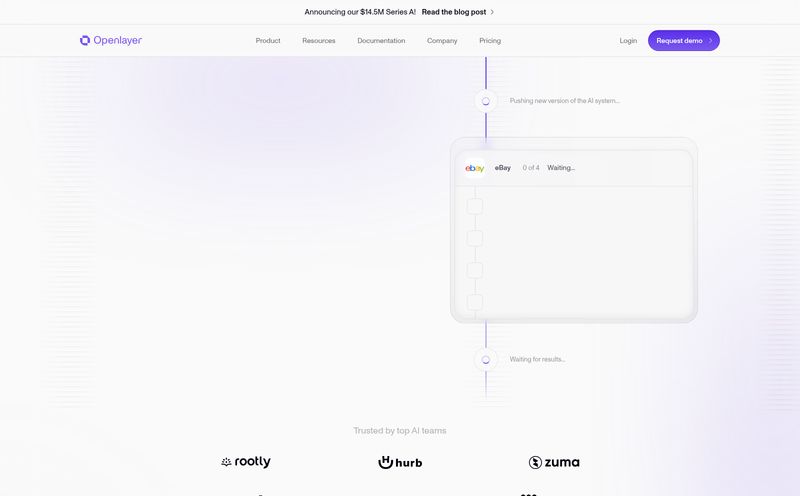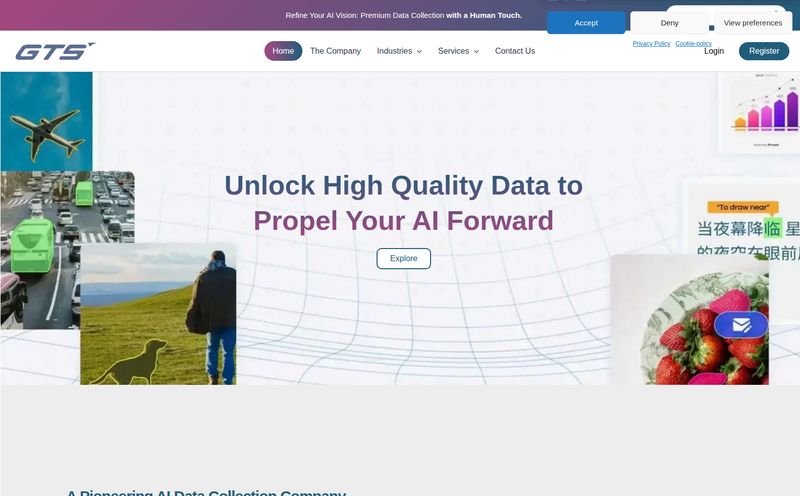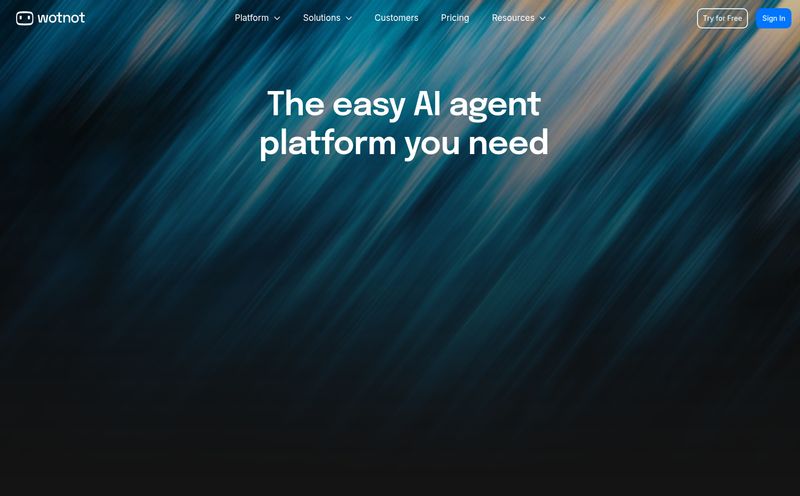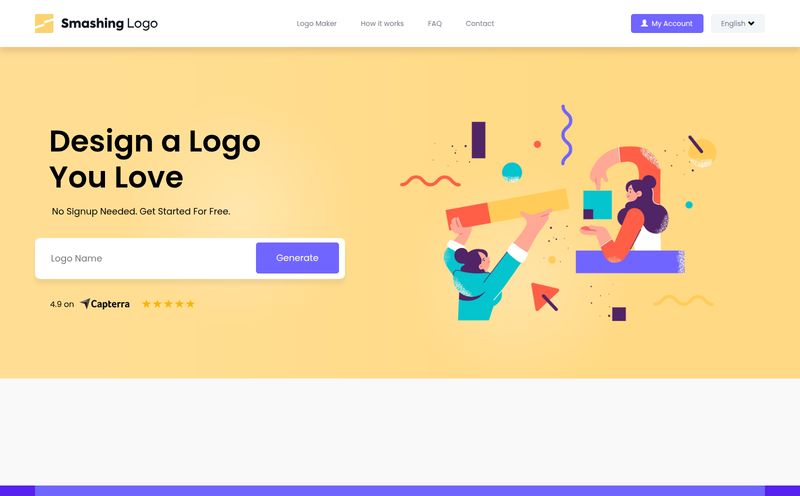If you've worked in digital marketing, sales, or really any desk job for more than a week, you know the pain. That special, soul-crushing kind of pain that comes from staring at a 50-page PDF report or a horribly structured website, knowing you have to manually copy and paste every last bit of useful information into a spreadsheet. It’s digital ditch-digging. It’s the stuff that makes you question your life choices.
I’ve been there more times than I can count. We’ve all heard the promises of AI and automation, but so many tools end up being either too complicated (requiring a PhD in Python) or too simplistic to handle real-world messy data. So, when I stumbled across Datatera.ai, I was skeptical. Another AI tool promising to solve all my problems? Sure. But the headline got me: “transform files and websites into structured data without coding.”
Without coding. Those two words are music to my ears. So I decided to take a look. Is it another piece of overhyped vaporware, or is it the real deal?
So, What Exactly is Datatera.ai?
At its heart, Datatera.ai is a data transformation platform. That sounds a bit corporate, so let me put it another way. Think of it as a universal translator for data. You feed it your messy, jumbled, unstructured information—a PDF price list, a website with contact info, a block of text from an email, even an image of a receipt—and it spits out a beautiful, clean, structured spreadsheet or sends the data directly to your CRM.
The magic is that you don’t have to tell it how to do it. You don’t need to map fields, you don’t need to write scrapers or parsers. The AI just... figures it out. It's less like being a developer and more like being a director. You just point it at the data and say, “Action!”

Visit Datatera.ai
This whole “no-code” approach is what sets it apart for me. It’s not built for developers. It’s built for the rest of us. The marketers, the sales teams, the founders, the researchers—the people who actually need the data but don't have the time or skills to wrestle it out of its cage.
The Features That Actually Matter
A tool can have a million features, but only a few usually make a real difference in your daily workflow. With Datatera.ai, a couple of things really stood out.
The Magic Wand: AI-Powered Extraction
This is the core of the whole thing. It’s not just pulling tables from a webpage. The AI seems to understand context. I saw on their site they're even launching a waitlist for something called an “AI Data Analyst Agent 24/7.” I can only speculate, but that sounds like it might be a conversational interface where you can literally ask your data questions. If that’s the case, it’s a game-changer. For now, its ability to intelligently pull names, emails, and company info from a chaotic block of text is impressive enough. It even handles things like deduplication and fuzzy matching, which is a lifesaver for cleaning up messy lead lists.
From PDFs to Videos: The Swiss Army Knife of Formats
Here’s where my jaw dropped a little. It claims to handle: Web pages, Text, HTML, XML, JSON, PDF, Images, MS Office documents, and even Audio and Video. I mean, come on. The potential there is insane. Think about transcribing a webinar or a podcast and having the AI automatically structure the key topics, speakers, and timestamps into a spreadsheet. That alone could save hours of work. I haven't tested the audio/video feature myself yet, but if it works even half as well as they claim, its a massive win.
Plays Nicely With Others: Solid Integrations
Getting the data is only half the battle. You need to send it where you actually do your work. Datatera.ai gets this. It integrates directly with the big players: HubSpot, Pipedrive, Airtable, Google Sheets, Notion, ClickUp, and more. This is critical. A tool without good integrations is like a car without wheels—it might look cool, but it’s not going to take you anywhere. The ability to scrape a list of prospects from a website and shoot them directly into your HubSpot pipeline is… well, it’s the dream, isn’t it?
My Experience: Putting Datatera.ai to the Test
Alright, talk is cheap. I had a perfect test case: a horribly formatted PDF from a virtual conference listing sponsors. It was a visual nightmare, with logos, weird spacing, and no clear table structure. Manually, this would have been a 45-minute job with a high chance of errors and a higher chance of me giving up for a coffee break.
I uploaded the file to Datatera.ai. It churned for a few seconds, and then presented me with a preview of the structured data it found. Company names in one column, website URLs in another. It wasn’t perfect on the first pass—it missed one or two—but a couple of clicks to guide the AI and it was done. I exported it straight to a Google Sheet. Total time? Maybe three minutes. They claim it’s 10x faster, and in this case, I'd say that's not even an exaggeration.
Let's Talk Money: A Look at Datatera.ai Pricing
This is always the big question. Is it affordable? The pricing structure seems pretty fair and is designed to scale with your needs.
| Plan | Price | Key Features |
|---|---|---|
| Free | Free | 20 transformations/month, 3Mb file size limit, standard integrations. |
| Plus | $19 / month | 100 transformations/month, 10Mb file size, handles paginated & scrolling pages. |
| Enterprise | $49+ / month | More transformations, API access, scheduler, full website scanning, on-premise option. |
My take: The Free plan is genuinely useful for a test drive or for someone who only needs this kind of thing once in a blue moon. The Plus plan at $19/month is the sweet spot. For freelancers, marketers, or small teams, the amount of time this saves makes the price an absolute no-brainer. The Enterprise plan is for the heavy hitters. If you need API access or have serious data security concerns, the on-premise option is a fantastic and rare feature.
The Good, The Bad, and The AI
No tool is perfect. Let's break it down, conversationally.
On the good side, it's fast, incredibly easy to use, and the range of file types it can handle is just fantastic. The no-code philosophy is at its core and they've executed it brilliantly. It’s an empowering tool.
On the other side, the main drawback is the one common to many B2B tools: the enterprise pricing is a bit of a black box. You have to “contact us,” which usually means entering a sales cycle. It's not a huge deal, but I always prefer transparent pricing. Also, the free plan is quite limited, which is understandable, but don't expect to run your entire business on it.
Who is Datatera.ai Actually For?
I can see a few people getting a ton of value out of this:
- Sales Teams: Building lead lists from online directories, conference websites, or PDFs in minutes, not hours.
- Marketers: Scraping competitor pricing, gathering social proof from review sites, or analyzing SERPs.
- Founders & Small Business Owners: Extracting data from invoices, bank statements, or supplier catalogs without hiring a data entry clerk.
- Researchers & Academics: Pulling data from research papers, reports, and archives without wanting to tear their hair out.
Frequently Asked Questions about Datatera.ai
- Do I need to know how to code to use Datatera.ai?
- Absolutely not. That’s the whole point. If you can drag and drop a file or copy and paste a URL, you have all the technical skills you need.
- What kinds of files can it really handle?
- A whole lot. The official list includes websites, raw text, HTML, XML, JSON, PDFs, images, and Microsoft Office files. The most intriguing are audio and video files, which suggests transcription and data structuring capabilities.
- Is there a free trial?
- Even better, there’s a permanent free plan. It has limits on usage (20 transformations per month) and file size, but it's perfect for trying out the core functionality.
- How does it integrate with my CRM?
- It offers direct integrations with popular platforms like HubSpot, Pipedrive, and Airtable. You can connect your accounts and have the extracted data sent directly, creating new records automatically.
- Is my data secure?
- For most users, standard cloud security practices apply. For businesses with very strict data privacy requirements, the Enterprise plan offers an on-premise or private cloud installation, meaning your data never leaves your own servers. This is a huge plus for regulated industries.
My Final Thoughts
In a world overflowing with AI hype, Datatera.ai feels refreshingly practical. It's not trying to be a magical black box that writes your emails for you; it's a purpose-built tool designed to solve one of the most tedious and universal problems in modern business: getting data from point A to point B without losing your sanity.
It’s powerful, accessible, and fairly priced. The fact that it's still evolving, with features like the “AI Data Analyst Agent” on the horizon, makes it a tool to watch. If you're still doing digital ditch-digging, you owe it to yourself to give Datatera.ai a try. It might just be the best $19 you spend all month.
Reference and Sources
- Datatera.ai Official Website
- The Rise Of The Citizen Developer And The No-Code Revolution (Forbes)
- HubSpot CRM Platform



